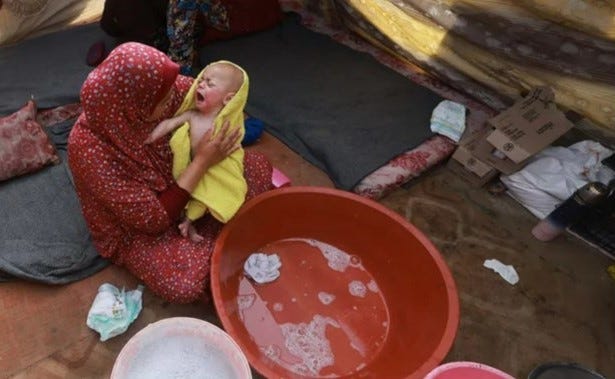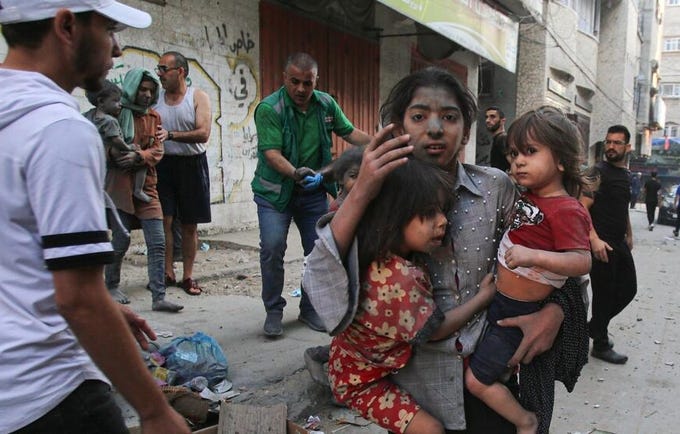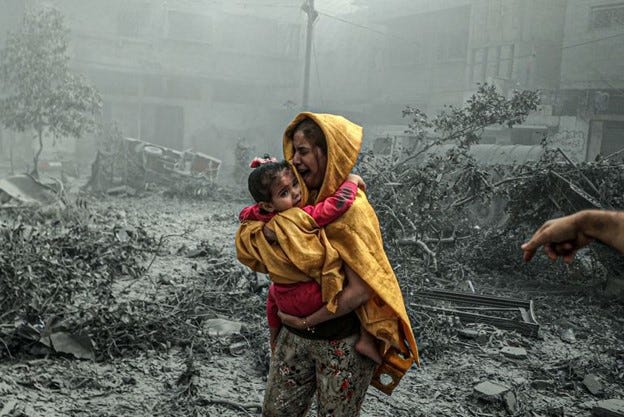A rift has sprung up among Democrats in the United States that threatens to widen as the November election approaches. And it may cost President Biden the election.
At the center of the rift is reproductive justice, a term which many people connect to Roe v. Wade and abortion rights, but which in practice includes the rights to reproductive and holistic healthcare and body sovereignty for all people, including Black, Brown, and Indigenous people.
But Israel’s war on Palestine has widened the aperture with which we view reproductive rights (and by extension, healthcare) in our own Western backyards and the way they compare with other, less-resourced countries.
Seldom have we seen a greater discrepancy in body justice than we do for women in Gaza (and, I might add, Sudan, the Congo, Syria, Yemen, Tigray, and elsewhere).
According to Unicef, the neonatal mortality rate of 8.8 deaths per 1,000 live births in Gaza was already massively high—more than double that of high-income countries.
So let’s take a bird’s-eye view into reproductive injustice in Gaza.
Childbirth in Gaza
Soon after Israel began bombardment of the Gaza Strip last October, global health groups raised the alarm that there were no longer any safe zones for pregnant women to give birth.
Now, nearly four months into Israel’s siege, amid a series of often contradictory evacuation orders from Israel, tens of thousands of people have fled to Rafah, a Palestinian city in the Southern Gaza Strip. The ever-worsening conditions in Gaza put everyone at even graver risk, particularly menstruating and pregnant women.
Pascale Coissard Rogeret has been working as an emergency medicine coordinator with Medicins Sans Frontieres (Doctors Without Borders) in Rafah. She recently wrote about her experience with women giving birth in the current conditions in Gaza, including Maha.
As Israel’s bombardment of Gaza intensified, Maha*—in her final weeks of pregnancy and originally from the north of Gaza—made the laborious journey south to Rafah. Maha had had a Cesarean section with a previous birth, and knew her body well. When her labor began, she could tell something was wrong, and that she needed to be admitted to the hospital. But the hospital was filled beyond capacity: All the delivery rooms were full, and they had to turn her away. Maha had no other options.
Her son died as she gave birth to him in the latrines closest to her tent.
Without the war, Pascale said, Maha’s son would not have died.
Another pregnant woman from Gaza, sheltering in a school, was forced to sleep on a cold floor that vibrated with each blast of fire from the Israeli Defense Forces. “My baby felt every explosion,” she told UNFPA, the United Nations Fund for Population Activities, the U.N.’s sexual and reproductive health agency.
The besieged Palestinian territories currently serve as home to about 55,000 pregnant women. Nour Beydoun is the regional adviser on protection and gender for CARE, a humanitarian organization that helps women and girls in conflict regions. Nour spoke to the Huffington Post about the gravity of the situation for pregnant women on the ground in Gaza.
What It’s Like to Be Pregnant in Gaza
Only one active hospital remains in Rafah, Nour reported, and the facility only has one operating room. Initially designed to accommodate 30-40 daily appointments, the hospital now sees ten times that amount—between 300 and 400 pregnant and postpartum women and newborns each day. Initially made to handle two to three cesarean sections per day, it now accommodates nearly 20 c-section deliveries daily.
Over half of Gaza’s pregnant women are anemic. According to the Lancet, anemia in pregnancy can increase the risk of preterm birth and low birthweight. Left untreated, these women will have increased complications during pregnancy, leaving their children at higher risk of developmental delays.
Despite this, nearly 200 women give birth every day. Of these, 15% are expected to need additional medical care due to pregnancy or birth-related complications.
Due to Israel's aid blockades, there are crucial shortages of drugs, blood products, and medical supplies, and fuel is being severely rationed at the remaining partially functional hospitals.
These shortages severely curtail access to life-saving obstetric care for women who are pregnant or postpartum.
Time Magazine reported that as Gaza runs out of fuel amid power outages, premature babies across Gaza are at severe risk.
The dire conditions imposed by Israel exacerbate the risk of maternal and newborn mortality.
Hiba Tibi, CARE’s acting deputy regional director for the Middle East and Africa, reports that there is no doctor, midwife, or nurse to support women during labor. Nor, she says, is there pain medication, anesthesia, or hygienic materials to support the birthing process or its aftermath.
Women are forced to go through the birthing process in overcrowded shelters, tents, or bathrooms without any assistance.
‘“Will I survive childbirth? Will my child survive? What will happen to my other children?’ These are very real dangers pregnant women and young mothers in Gaza have faced for the past 100 days, with no end in sight,” said Tibi.
Not surprisingly, CARE reported via the Al-Shifa Hospital manager in Gaza City, pregnant women in Gaza have experienced a 300 percent increase in miscarriages due to stress, shock, and the lack of maternal and neonatal care in the region.
The rate of maternal mortality is also high. “There’s now so much risk of hemorrhaging and infections without the right tools and medicines,” said Nour Beydoun.
Ammal Awadallah, executive director of the Palestinian Family Planning and Protection Association (PFPPA), spoke to the online journal Jezebel. Awadallah, currently based in Jerusalem, reported that most births “are being attended without basic medical supplies.
Even more alarming, many women have been forced to undergo emergency c-sections without anesthesia. And due to a lack of clean medical tools for the procedure, these women also face post-cesarean wound infections.

The Problem of Aftercare in Gaza
Back in October, when the situation was not nearly as dire, Al-Aqsa Hospital staff told the Associated Press that many mothers in Gaza were forced to mix baby formula with contaminated water.
And now, the entire population of Gaza is food insecure, with a 94% reduction in the water supply. Pregnant or lactating women require higher water and caloric intake to ensure healthy pregnancies and birth outcomes—and this isn’t happening in Gaza.
As a result of Israel’s blockade, lack of water and malnutrition have been especially detrimental for nursing mothers. “Women are struggling to breastfeed their babies as they aren’t able to produce milk without having water to drink nor sufficient food to eat,” Ammal Awadallah told Jezebel.
In a letter provided by CARE, Alaa, a Gazan mother, wrote that “no one is eating enough,” and “it is usually the mothers who eat last” in order to feed their children first. “I slept on an empty stomach every night so my children wouldn’t go hungry.”
Catalyzed by Israel’s blockade of aid, severe food shortages have left both mothers and newborn babies malnourished, resulting not only in poor personal health but poor fetal and newborn health.” Beydoun added that CARE has heard about “significant weight loss” among pregnant and postnatal women.
Due to drastically limited resources, Awadallah said, few women are able to obtain or to attend postnatal appointments. Many have no options but to remain in overcrowded shelters, which exposes them to further infection and disease.
Premature babies without access to hospital incubators are dying.
What’s more, according to Nour Beydoun, full-term babies are “dying from a lack of sterile environment and specialized staff.”
Alongside the lack of clean water, food, and medical supplies, menstrual products are largely inaccessible to Palestinians,1.8 million of whom have been internally displaced.
Who Bears Responsibility?
The first and most obvious answer is Israel. In its recent ruling, the International Court of Justice cited Article II of the Genocide Convention, one element of which defines genocide as “imposing measures intended to prevent births within the group.”
It’s hard to think of a more apt example of preventing births within a group than the reality for pregnant women and new mothers in Gaza.
The ICJ has essentially demanded that Israel actively care for Gaza’s pregnant women, and to take steps to prevent harm to them and their unborn and newborn babies.
The United States, the U.K., Canada, and many European countries are also complicit in Israel’s assault on childbirth.
Despite promises by the U.S. and other governments to use a United Nations Security Council resolution passed in December to dramatically increase humanitarian aid for Gaza, aid experts say they have yet to see a real improvement.
Instead, they say, conditions are worsening.
An internal U.S. government estimate circulated in January identified that Israel, which is receiving huge American and foreign support, continues to bar aid for some of the most desperate people in Gaza.
A State Department document that a U.S. official described to HuffPost reported that the situation in northern Gaza—where Israel has said it has wound down major military operations—had not improved since the ICJ ruling. The document highlights that Israeli Defense Forces have denied multiple proposals to move supplies, including fuel and medicine, into the region, where 300,000 Palestinians still live, the U.S. official said.
Meanwhile, Dave Harden, a former senior U.S. official who worked in Israel-Palestine, told Huffington Post that the December U.N. resolution the U.S. helped craft—and watered down—had yielded little results. The resolution was expected to bolster pressure for a surge in assistance through the appointment of a U.N. coordinator. “The evidence is clear,” Harden said. “It’s been useless,”
Jeremy Konyndyk, the president of the nonprofit Refugees International, previously worked on humanitarian issues in the Biden and Obama administrations. Konyndyk said,
“When you’re in a famine situation—which is what Gaza’s facing now—you need overwhelming force. You need the humanitarian equivalent of shock and awe.”
And as many now know, the U.S., Canada, the U.K., Germany, Switzerland, the Netherlands, Italy, and Australia have paused funding to UNRWA, putting the lives of everyone in Gaza in immediate jeopardy. (Read more about why this matters here.)
How We Do Better Before the U.S. Elections
A Trump presidency and Republican-led Congress would end all vestiges of abortion protections currently in place in the United States. Just this week, Republicans in Tennessee and Oklahoma introduced travel ban bills that would make it a felony to help a minor leave the state to access abortion care.
In the 14 states that have enacted abortion bans since the Dobbs decision to overturn Roe in 2022, nearly 65,000 pregnancies associated with rape occurred.
And in June of 2023, President Biden said publicly that he was “not big on abortion—although he added that “Roe v. Wade got it right.” But many pro-choice activists say that he has not done enough to protect abortion rights.
And Biden’s stance on Israel has led to a very big problem with his electability, not only with Arab and Muslim and Gen Z and Millenial voters, but with BIPOC voters and true feminists.
A growing number of these voters support the liberation of Palestine. They are saying that they will not vote for Biden in November, even though this means he may lose to Trump.
Saba Saed, a young woman from Michigan, stated, “I think it would be hypocritical of me to use reproductive rights as a way to justify voting for Biden,” in an interview with CBS’s “Face the Nation” last week. “Biden is aiding and sending military aid to Israel, which is air-striking Gaza and blocking humanitarian aid leading to women there who are pregnant either getting c-sections without anesthesia, not being able to be provided with prenatal care.”
The Roe v. Wade decision itself always had limitations in its ability to equally support the bodily autonomy, health, and safety of all women, particularly women of color. In the years following the ruling in 1973, Black feminist organizers led the demand for a framework of reproductive justice beyond reproductive rights, a justice which incorporates more than the right to end a pregnancy—like maternal care, for instance.
The fight for reproductive justice essentially embodies the fight to produce, reproduce, and sustain life in conditions of freedom and safety—the very conditions the current administration is rendering impossible, both for American women and, importantly, women in Gaza.
Asking feminists to vote for a President who uses U.S. tax dollars to, in the words of the Genocide Convention, “impose measures intended to prevent births within the group” is too painful for many women to contemplate.
To do so would be, in the minds of many, to advance a form of liberal feminism that echoes a painful history of white feminism in the U.S. that fought selectively for their own rights and sacrificed the rights and body sovereignty—of Black, Indigenous, and Women of Color.
A growing number of women are unwilling to repeat these mistakes—and are irrevocably changed by the plight of our sisters halfway around the world in Gaza.
And if President Biden and his team don’t wake up to this fact—and soon—we’re all in trouble here in the U.S.
Sources:
Global health groups raised the alarm that there were no longer safe zones: “Race against death” amid relentless bombardment in Gaza, pregnant women tell UNFPA. (n.d.). Retrieved January 28, 2024, from https://www.unfpa.org/news/%E2%80%9Crace-against-death%E2%80%9D-amid-relentless-bombardment-gaza-pregnant-women-tell-unfpa
Without the war, Pascale said, Maha’s son would not have died: What it’s like to be pregnant in Gaza right now. (n.d.). Doctors Without Borders - USA. Retrieved January 29, 2024, from https://www.doctorswithoutborders.org/latest/what-its-be-pregnant-gaza
Another pregnant woman from Gaza, sheltering in a school, was forced to sleep on a cold floor: Gaza Hospitals Overrun With Pregnant Women And Newborns—Despite U.S. Promises Of Aid. (2024, January 18). HuffPost. https://www.huffpost.com/entry/gaza-hospitals-overrun-despite-promises-us-aid_n_65a9693ae4b00bbb446e6149
According to the Lancet, anemia in pregnancy can increase the risk of: Pregnant women in Gaza require urgent protection—The Lancet. (n.d.). Retrieved January 30, 2024, from https://www.thelancet.com/journals/lancet/article/PIIS0140-6736(23)02835-0/fulltext
Time Magazine reported that as Gaza runs out of fuel amid power outages: What Pregnant Women Face in Gaza. (2023, November 9). TIME. https://time.com/6333474/israel-hamas-gaza-pregnant-women-hospital/
Women are forced to go through the birthing process: Gaza Hospitals Overrun With Pregnant Women And Newborns—Despite U.S. Promises Of Aid. (2024, January 18). HuffPost. https://www.huffpost.com/entry/gaza-hospitals-overrun-despite-promises-us-aid_n_65a9693ae4b00bbb446e6149
Hiba Tibi, CARE’s acting deputy regional director for the Middle East and Africa, reports that: Gaza Hospitals Overrun With Pregnant Women And Newborns—Despite U.S. Promises Of Aid. (2024, January 18). HuffPost. https://www.huffpost.com/entry/gaza-hospitals-overrun-despite-promises-us-aid_n_65a9693ae4b00bbb446e6149
Pregnant women in Gaza have experienced a 300% increase in miscarriage: Miscarriages in Gaza Have Increased 300% Under Israeli Bombing. (2024, January 17). Jezebel. https://jezebel.com/miscarriages-in-gaza-have-increased-300-under-israeli-1851168680
many women have been forced to undergo emergency c-sections without anesthesia: Pregnant Women in Gaza Are Undergoing C-Sections Without Anesthesia as Humanitarian Crisis Worsens. (2023, November 2). Jezebel. https://jezebel.com/pregnant-women-in-gaza-are-undergoing-c-sections-withou-1850982366
Catalyzed by Israel’s blockade of aid, severe food shortages have left newborn babies: Gaza Hospitals Overrun With Pregnant Women And Newborns—Despite U.S. Promises Of Aid. (2024, January 18). HuffPost. https://www.huffpost.com/entry/gaza-hospitals-overrun-despite-promises-us-aid_n_65a9693ae4b00bbb446e6149
Women are struggling to breastfeed their babies as they aren’t able to produce milk: Miscarriages in Gaza Have Increased 300% Under Israeli Bombing. (2024, January 17). Jezebel. https://jezebel.com/miscarriages-in-gaza-have-increased-300-under-israeli-1851168680
Alongside the lack of clean water, food, and medical supplies, menstrual: Batrawy, A., & Bashir, A. B. (2024, January 11). Another layer of misery: Women in Gaza struggle to find menstrual pads, running water. NPR. https://www.npr.org/sections/goatsandsoda/2024/01/11/1224201620/another-layer-of-misery-women-in-gaza-struggle-to-find-menstrual-pads-running-wa
Back in October, when the situation was not as dire, Al-Aqsa Hospital staff: Israel-Hamas war: Fuel running out in Gaza’s hospital put premature babies at risk | AP News. (n.d.). Retrieved January 30, 2024, from https://apnews.com/article/israel-gaza-hamas-babies-crisis-9ec2e404e16a132821dac644af110ef6
And in June of 2023, President Biden said publicly that he was “not big on abortion: https://www.cbsnews.com/news/joe-biden-abortion-catholic-faith-roe-v-wade-got-it-right/. See also: https://www.theguardian.com/commentisfree/2023/jun/29/biden-abortion-rights-dobbs-roe-v-wade See also: https://thehill.com/homenews/administration/4070735-biden-says-as-catholic-hes-not-big-on-abortion-but-thinks-roe-got-it-right/







What actions can we take to change this heartbreaking situation?
Thank you for highlighting this appalling situation.